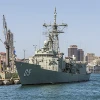219 careers found.
Museum officers prepare specimens for collections, and construct and arrange museum and art gallery exhibits.
Natural resource managers develop conservation plans for nature reserves, land and other natural resources, so that people can use these resources in an ecologically sustainable way. Natural resource managers specialising in land and biological resources work in agencies where they can apply ecological and planning principles to the management of renewable resources such as forests, grasslands and agricultural landscapes. Natural resource managers specialising in water and soil resources may apply their skills to several areas, including irrigated agriculture, drainage, water supply, water catchment management, pollution control and rehabilitation after mining activities.
Natural therapists specialise in a range of complementary and alternative medical techniques and remedies (including homeopathy, herbalism and aromatherapy), which they use to diagnose, treat and prevent physical illness or dysfunction.
Naval architects design and oversee the construction, survey and repair of marine craft and floating structures, including naval craft, passenger and cargo ships, submarines, high-speed ferries and catamarans, tugs, boats, yachts and oil rigs.
Navy officers manage, lead, train and take responsibility for maintaining the team spirit and safety of the Navy's non-commissioned officers and sailors.
Navy sailors undertake a wide range of peacetime and wartime work on land and at sea, including communications, supply, seamanship, motor transport, combat systems operation, hospitality and stores.
Navy technical sailors are trained for peacetime and wartime work as electronic, marine and aviation specialists and in other technical areas.
Non-destructive testing technicians examine and test the functionality and performance of an object or material in a way that will not affect its usefulness.
Nuclear Medicine Scientists (also known as Nuclear Medicine Technologists) are highly skilled health experts who use very small quantities of radionuclides to diagnose diseases — by detecting physiological and metabolic changes within the body and using the same principles to treat diseases. A career in nuclear medicine combines the humanities of patient care, sociology of health, cutting-edge science (instrumentation and computing) with health/medical science. Get qualified to deliver radionuclide therapies and to provide diagnosis using a gamma camera, SPECT, PET, SPECT/CT, PET/CT, PET/MRI and CT. If you believe that radiography or radiation therapy could be a suitable career choice for you, then a career in nuclear medicine, which combines imaging and therapy, would be a great fit. The starting average weekly salary for fresh graduates ranges from $1,288, with the potential to increase to $1,430 or more as you gain experience, along with superannuation benefits (according to Indeed data).
Registered nurses assess, plan, provide and evaluate preventative, curative and rehabilitative care for patients, clients and residents in a wide variety of settings.
Nutritionists study and provide advice about dietary habits to encourage the achievement of a healthy lifestyle.
Occupational health and safety officers coordinate health and safety systems in an organisation. They identify hazards, assess risks to health and safety, put appropriate safety controls in place and provide advice about accident prevention and occupational health to management and employees. With experience and sometimes further training, occupational health and safety officers may become auditors, who inspect a workplace's level of compliance with health and safety standards.
Occupational therapists assess and treat people who, due to illness, injury or circumstance, are limited in their ability to undertake everyday activities. They assist people to regain lost functions, develop their abilities and social skills, as well as maintain and promote independence in their everyday lives to enhance health and wellbeing.
Operating theatre technicians prepare and maintain operating theatres and equipment, assist surgical and anaesthetic teams during operations, and provide support to patients in recovery.
Optometrists perform eye examinations to determine the presence of vision problems and other eye conditions and disease. They treat or manage these problems by prescribing glasses, contact lenses, optical aids, vision therapy, medication (in the form of eye drops) or referral to an eye surgeon when required.








